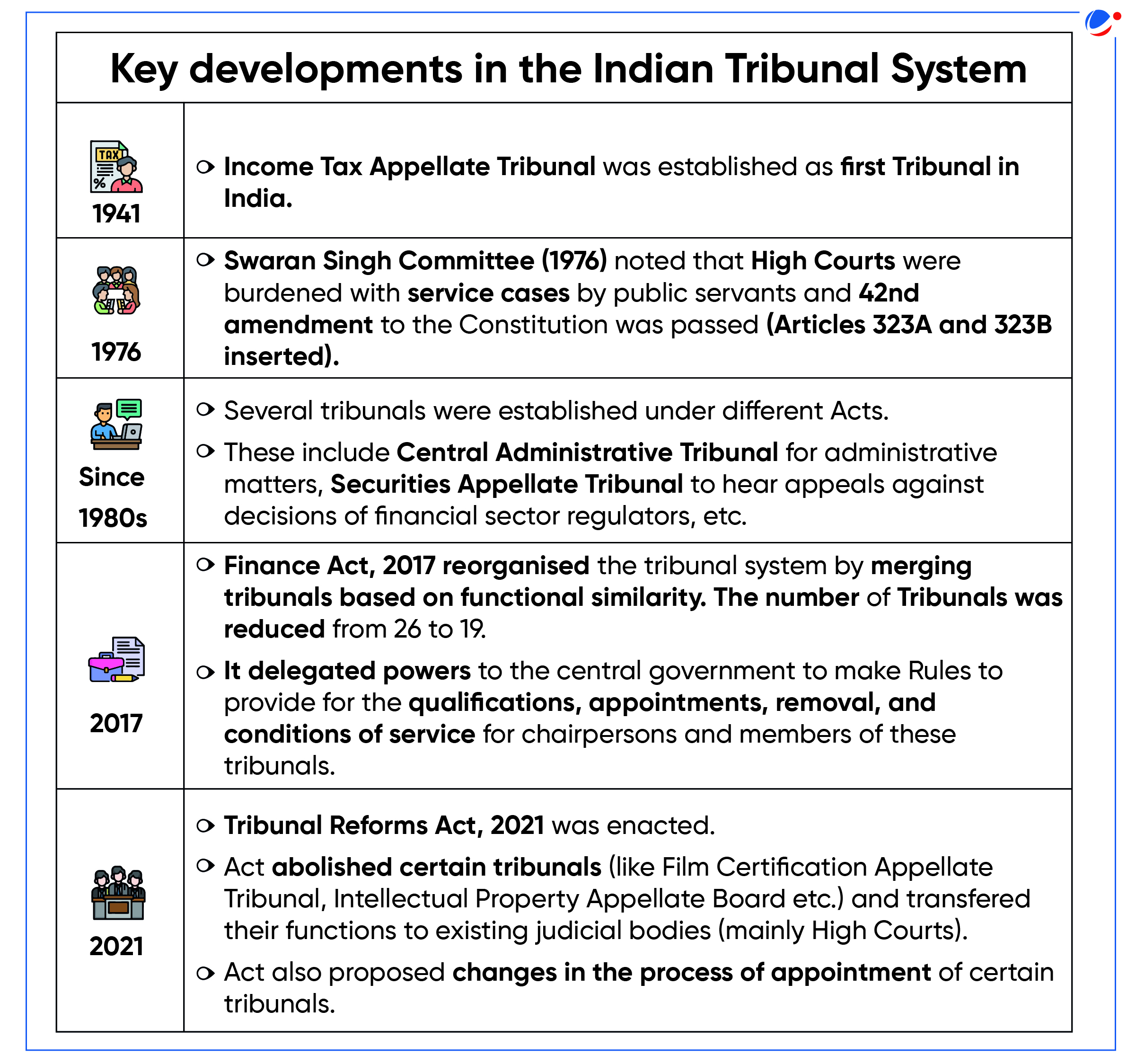Why in the News?
Recently, the Supreme Court (SC) ruled that tribunals cannot direct the government to frame policy.
More about News
- Context: SC was deciding on whether the Armed Forces Tribunal (AFT) could have directed the government to make a policy to fill up the post of Judge Advocate General (Air).
- The AFT was set up under the AFT Act, of 2007.
- AFT provide for adjudication or trial of disputes and complaints to the commission, appointments, enrolment and conditions of service in respect of persons subject to the Army Act, 1950, Navy Act, 1957, Air Force Act, 1950.
- It can further provide for appeals arising out of orders, findings or sentences of courts-martial held under the said Acts and for matters connected therewith or incidental thereto.
- Court Ruling: SC held that a tribunal subject to the High Court’s jurisdiction under Article 226, cannot be permitted by law, to direct the framing of a policy by the Government.
- Also, SC said that making policy is not in the domain of the Judiciary.
About Tribunals System
- Nature: Tribunals are quasi-judicial bodies. The objective may be to reduce the caseload of the judiciary or to bring in subject expertise for technical matters.
- Constitutional Recognition: In 1976, Articles 323A and 323B were inserted in the Constitution of India through the 42nd Amendment.
- Article 323A: Empowered Parliament to constitute administrative Tribunals (both at central and state level) for adjudication of matters related to recruitment and conditions of service of public servants.
- Article 323B: Specified certain subjects (such as taxation and land reforms) for which Parliament or state legislatures may constitute tribunals by enacting a law.
- In 2010, the Supreme Court clarified that subject matters under Article 323B are not exclusive, and legislaturesare empowered to create tribunals on any subject matter under their purview as specified in the Seventh Schedule of the Constitution.
- Composition of Tribunals: The presence of expert members (technical members) along with judicial members is a key feature of tribunals which distinguishes them from traditional courts.
- Jurisdiction: Each tribunal is given specific jurisdiction to hear and decide cases within its designated area of expertise.
- Some tribunals have appellate jurisdiction, meaning they hear appeals from decisions made by lower authorities or government bodies.
- Appeals: Appeals from tribunals usually lie with the concerned High Court. However, some laws specify that appeals will be heard by the Supreme Court.
- In Chandra Kumar Case (1997), appeals against decisions of tribunals were allowed in the division bench of High Courts.
- Currently, tribunals have been created both as substitutes to High Courts and as subordinate to High Courts.

Significance of Tribunals
- Specialization: This specialization ensures that cases are adjudicated by individuals with a deep understanding of the relevant legal and technical issues.
- Speedy Resolution: This is particularly important in areas where timely decisions are crucial, such as service matters, tax disputes, and environmental issues.
- Reduced Case Load: By handling specific types of cases, tribunals contribute to reducing the burden on traditional courts, helping to address the issue of judicial backlog.
- Accessibility: Tribunals are geographically dispersed, with benches located across the country.
- Efficiency in Service Matters: Administrative Tribunals, such as the Central Administrative Tribunal (CAT), expedite the resolution of service-related matters for government employees.
Concerns with Tribunals
- Lack of Independence: Critics argue that certain tribunals might not be entirely independent, as their members are often appointed by the government.
- This raises concerns about the potential for undue influence or interference in decision-making.
- In 2019, the SC reiterated that the lack of judicial dominance in selection committees of tribunals violates the doctrine of separation of powers.
- Pendency of cases: For example, in 2021, the AFT had 18,829 pending cases.
- The lack of human resources is observed to be one of the key reasons for the accumulation of pending cases in courts.
- Term of office: In 2019, SC stated that a short tenure of members along with provisions of re-appointment increases the influence and control of the Executive over the judiciary.
- Lack of Uniformity in Procedures: Procedures adopted by different tribunals can vary widely, leading to inconsistency in the application of legal principles and potential confusion for litigants.
- Overlapping Jurisdictions: There have been instances of overlapping jurisdictions between tribunals and regular courts, leading to confusion and potential conflicts.
- Concerns Regarding Technical Members: In certain tribunals, technical members may lack legal qualifications.
Way Ahead
- Enhance Independence: Mechanism for appointment and removal of members in tribunals, and tenure of their employment should have adequate protection from legislative and executive interference.
- Administration of Tribunals: The Standing Committee on Personnel, Public Grievances, Law and Justice (2015) recommended the creation of an independent body called the National Tribunals Commission (NTC) for the administration of all tribunals in India.
- In 2020, SC also emphasised creating NTC to supervise appointments, as well as the functioning and administration of tribunals.
- Timely Appointments: Expedite the appointment process for tribunal members to prevent delays in the resolution of cases and reduce backlogs.
- A judicial impact assessment would be helpful to determine the extra resources required to handle fresh cases resulting from the enactment of a new law.
- Clear Jurisdictional Boundaries: Clearly define and demarcate the jurisdiction of each tribunal to avoid overlapping and conflicting decisions with regular courts.
- Training and Qualifications: Ensure that technical members of tribunals possess adequate legal qualifications or receive training to understand legal principles, promoting a better understanding of the legal context.





